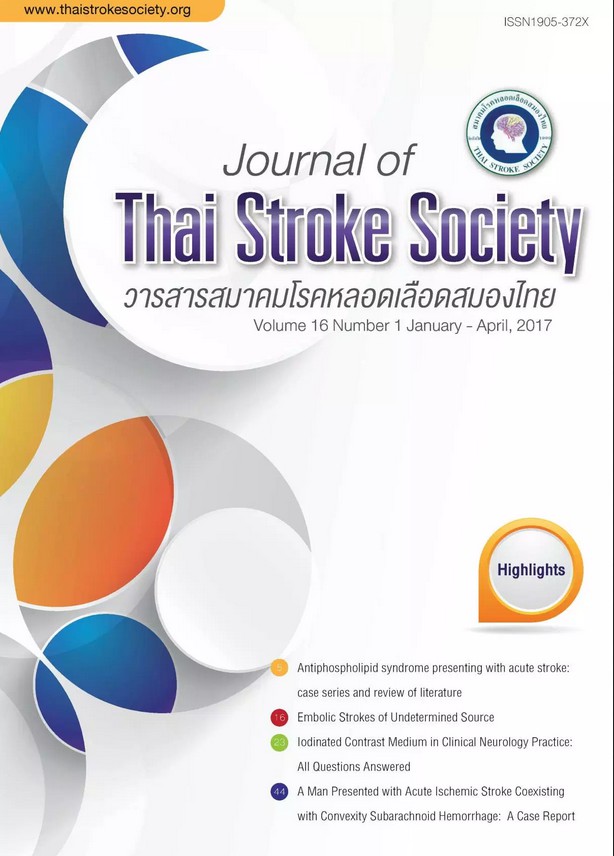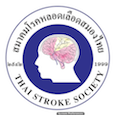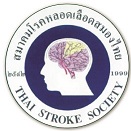Antiphospholipid syndrome presenting with acute stroke: case series and review of literature
คำสำคัญ:
antiphospholipid syndrome, antiphospholipid antibodies, stroke, cerebrovascular diseaseบทคัดย่อ
กลุ่มอาการแอนติฟอสโฟลิปิด (antiphospholipid syndrome, APS) เป็นโรคภูมิต้านตนเองที่พบไม่บ่อย มีลักษณะสำคัญประกอบด้วยการเกิดลิ่มเลือดอุดตันในหลอดเลือดดำหรือแดง และภาวะแทรกซ้อนระหว่างการตั้งครรภ์ ร่วมกับการตรวจพบแอนติฟอสโฟลิปิดแอนติบอดี ผู้ป่วยอาจมาพบแพทย์ ด้วยอาการที่หลากหลายขึ้นกับอวัยวะที่เกิดพยาธิสภาพ ภาวะสมองขาดเลือดเป็นอาการนำที่พบบ่อยในผู้ป่วยกลุ่มอาการ APS อย่างไรก็ตาม การจำแนกผู้ป่วยที่มีภาวะสมองขาดเลือดจาก APS ออกจากผู้ป่วยทั่วไปนั้นมีความท้าทาย ในการศึกษานี้ได้นำเสนอผู้ป่วยจำนวน 3 รายที่มาตรวจที่โรงพยาบาลธรรมศาสตร์เฉลิมพระเกียรติด้วยอาการและอาการแสดงของภาวะสมองขาดเลือดเฉียบพลัน โดยท้ายที่สุดแล้วผู้ป่วยได้รับการวินิจฉัยว่าเป็นกลุ่มอาการ APS ในส่วนท้ายได้ทำการทบทวนวรรณกรรมเกี่ยวข้องกับระบาดวิทยา ปัจจัยเสี่ยง ลักษณะทางคลินิก ลักษณะทางภูมิคุ้มกันวิทยา ลักษณะทางรังสีวิทยา หลักการวินิจฉัย แนวทางการรักษา และพยากรณ์โรค ของผู้ป่วยกลุ่มอาการ APS ที่มาด้วยภาวะสมองขาดเลือดเฉียบพลัน
เอกสารอ้างอิง
Asherson RA, Khamashta MA, Ordi-Ros J, et al. The “primary” antiphospholipid syndrome: major clinical and serological features. Medicine
(Baltimore). 1989;68(6):366-74.
Meroni PL, Borghi MO, Raschi E, et al. Pathogenesis of antiphospholipid syndrome: understanding the antibodies. Nature reviews Rheumatology.
2011;7(6):330-9.
Oku K, Nakamura H, Kono M, et al. Complement and thrombosis in the antiphospholipid syndrome. Autoimmun Rev. 2016.
Nayfe R, Uthman I, Aoun J, et al. Seronegative antiphospholipid syndrome. Rheumatology (Oxford). 2013;52(8):1358-67.
Kazzaz NM, McCune WJ, Knight JS. Treatment of catastrophic antiphospholipid syndrome. Curr Opin Rheumatol. 2016.
Biggioggero M, Meroni PL. The geoepidemiology of the antiphospholipid antibody syndrome. Autoimmun Rev. 2010;9(5):A299-304.
Muscal E, Brey RL. Antiphospholipid syndrome and the brain in pediatric and adult patients. Lupus. 2010;19(4):406-11.
Cervera R, Boffa MC, Khamashta MA, et al. The Euro-Phospholipid project: epidemiology of the antiphospholipid syndrome in Europe. Lupus. 2009;18(10):889-93.
Garcia-Carrasco M, Galarza C, Gomez-Ponce M, et al. Antiphospholipid syndrome in Latin American patients: clinical and immunologic characteristics and comparison with European patients. Lupus. 2007;16(5):366-73.
Yoon KH, Fong KY, Sivalingam P, et al. Antiphospholipid syndrome in Asians: clinical manifestations, serological markers and outcome of the National University of Singapore/National University Hospital antiphospholipid cohort. APLAR J Rheumatol. 2003;6:128-36.
Tan BE, Thong BY, Shivananda S, et al. Clinical manifestations and outcomes of antithrombotic treatment of the Tan Tock Seng Hospital Singapore
antiphospholipid syndrome cohort. Lupus. 2009;18(8):752-8.
Fujieda Y, Atsumi T, Amengual O, et al. Predominant prevalence of arterial thrombosis in Japanese patients with antiphospholipid syndrome. Lupus. 2012;21(14):1506-14.
Pengo V, Biasiolo A, Pegoraro C, et al. Antibody profiles for the diagnosis of antiphospholipid syndrome. Thrombosis and haemostasis. 2005;93(6):1147-52.
Urbanus RT, Siegerink B, Roest M, et al. Antiphospholipid antibodies and risk of myocardial infarction and ischaemic stroke in young women in the RATIO study: a case-control study. Lancet Neurol. 2009;8(11):998-1005.
Rodriguez-Sanz A, Martinez-Sanchez P, Prefasi D, et al. Antiphospholipid antibodies correlate with stroke severity and outcome in patients with antiphospholipid syndrome. Autoimmunity. +2015;48(5):275-81.
Erkan D, Yazici Y, Peterson MG, et al. A crosssectional study of clinical thrombotic risk factors and preventive treatments in antiphospholipid syndrome. Rheumatology (Oxford). 2002;41(8):924-9.
de Souza AW, Silva NP, de Carvalho JF, et al. Impact of hypertension and hyperhomocysteinemia on arterial thrombosis in primary antiphospholipid
syndrome. Lupus. 2007;16(10):782-7.
Provenzale JM, Barboriak DP, Allen NB, et al. Patients with antiphospholipid antibodies: CT and MR findings of the brain. AJR American journal of roentgenology. 1996;167(6):1573-8.
Zhu DS, Fu J, Zhang Y, et al. Neurological antiphospholipid syndrome: Clinical, neuroimaging, and pathological characteristics. Journal of the neurological sciences. 2014;346(1-2):138-44.
Verro P, Levine SR, Tietjen GE. Cerebrovascular ischemic events with high positive anticardiolipin antibodies. Stroke. 1998;29(11):2245-53.
Rodrigues CE, Carvalho JF, Shoenfeld Y. Neurological manifestations of antiphospholipid syndrome. Eur J Clin Invest. 2010;40(4):350-9.
Wu S, Xu Z, Liang H. Sneddon’s syndrome: a comprehensive review of the literature. Orphanet journal of rare diseases. 2014;9:215.
Miyakis S, Lockshin MD, Atsumi T, et al. International consensus statement on an update of the classification criteria for definite antiphospholipid syndrome (APS). J Thromb Haemost. 2006;4(2):295-306.
Pengo V, Tripodi A, Reber G, et al. Update of the guidelines for lupus anticoagulant detection. Subcommittee on Lupus Anticoagulant/Antiphospholipid Antibody of the Scientific and Standardisation Committee of the International Society on Thrombosis and Haemostasis. J Thromb Haemost. 2009;7(10):1737-40.
Pengo V. ISTH guidelines on lupus anticoagulant testing. Thromb Res. 2012;130 Suppl 1:S76-7.
Pengo V, Banzato A, Bison E, et al. Laboratory testing for antiphospholipid syndrome. Int J Lab Hematol. 2016.
Ruiz-Irastorza G, Cuadrado MJ, Ruiz-Arruza I, et al. Evidence-based recommendations for the prevention and long-term management of thrombosis in antiphospholipid antibody-positive patients: report of a task force at the 13th International Congress on antiphospholipid antibodies. Lupus. 2011;20(2):206-18.
Pengo V, Ruffatti A, Del Ross T, et al. Confirmation of initial antiphospholipid antibody positivity depends on the antiphospholipid antibody profile. J Thromb Haemost. 2013;11(8):1527-31.
Tektonidou MG, Laskari K, Panagiotakos DB, et al. Risk factors for thrombosis and primary thrombosis prevention in patients with systemic lupus erythematosus with or without antiphospholipid antibodies. Arthritis Rheum. 2009;61(1):29-36.
Sciascia S, Lopez-Pedrera C, Cecchi I, et al. Nonvitamin K antagonist oral anticoagulants and antiphospholipid syndrome. Rheumatology (Oxford). 2016.
Cervera R, Serrano R, Pons-Estel GJ, et al. Morbidity and mortality in the antiphospholipid syndrome during a 10-year period: a multicentre prospective study of 1000 patients. Ann Rheum Dis. 2015;74(6):1011-8.
ดาวน์โหลด
เผยแพร่แล้ว
รูปแบบการอ้างอิง
ฉบับ
ประเภทบทความ
สัญญาอนุญาต
ข้อความภายในบทความที่ตีพิมพ์ในวารสารสมาคมโรคหลอดเลือดสมองไทยเล่มนี้ ตลอดจนความรับผิดชอบด้านเนื้อหาและการตรวจร่างบทความเป็นของผู้นิพนธ์ ไม่เกี่ยวข้องกับกองบรรณาธิการแต่อย่างใด การนำเนื้อหา ข้อความหรือข้อคิดเห็นของบทความไปเผยแพร่ ต้องได้รับอนุญาตจากกองบรรณาธิการอย่างเป็นลายลักษณ์อักษร ผลงานที่ได้รับการตีพิมพ์ในวารสารเล่มนี้ถือเป็นลิขสิทธิ์ของวารสาร





